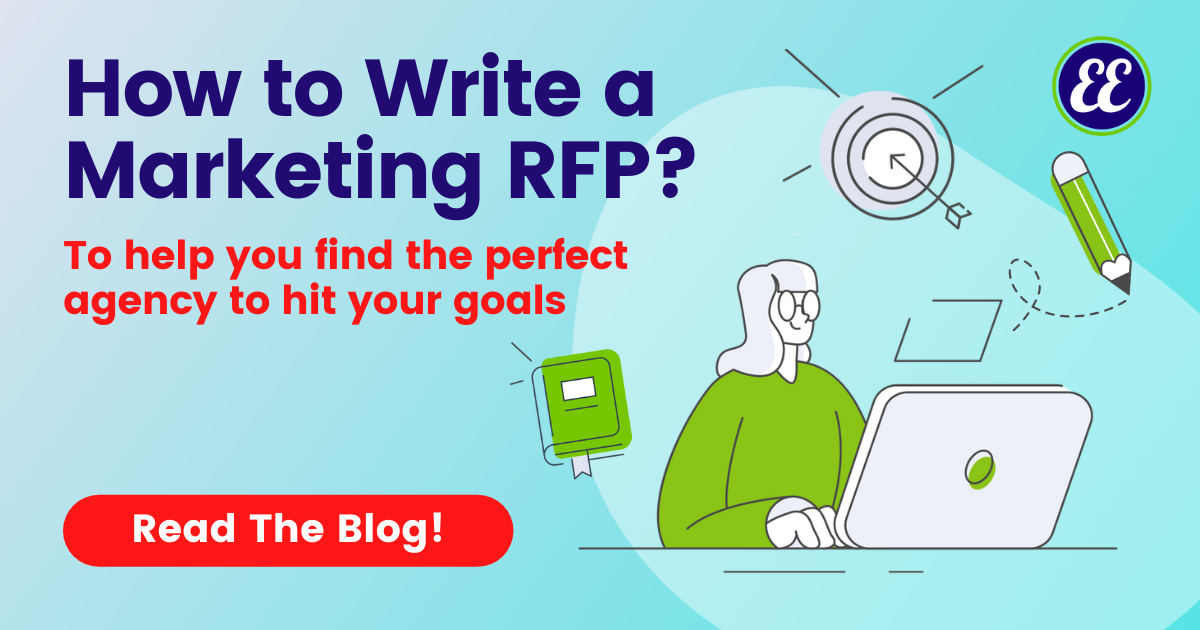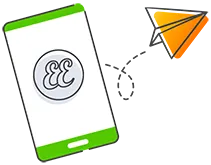Writing a solid RFP helps to ensure you find the right partner to work with to meet your marketing and enrollment goals, no matter how audacious.
I have worked on every side of an RFP. Universities have hired me in the past to write their RFPs. Other institutions have hired me to be a part of the evaluation team. I have helped other vendors write their RFP responses and finally, as an agency, we have responded to RFPs.
I have empathy for all sides as parties of an RFP process! While putting out an RFP is often a state requirement, it is not an ideal way of finding a new vendor/partner to work with.
Watch this Video to Get More Insights
What Vendors Think of RFPs
Here is why more vendors do not submit RFP responses.
Scenario 1: Institutions have preferred vendors going into the RFP process
Many state schools are required to go through the RFP process. As vendors, we do not know if the RFP being put out already has a preferred vendor the school will move forward with. Knowing that many schools already have a preferred vendor and putting out an RFP is a requirement, many vendors are weary of spending the time to put together a proposal.
Vendors know that most of the time, responding to RFPs is a complete waste of time. The school already has a preferred vendor and will select that vendor.
Scenario 2: Institution has no intention of moving forward with the work
At times, some schools put out an RFP with no intention of moving forward with the initiative. They are using these proposals to validate that it’s better to stick with in-house resources or to stay the course of their current strategy.
Scenario 3: Vendors are burned out and mistreated during this process
Vendors are not always treated well in this process. At times, these RFPs feel like they are setting up adversarial relationships with vendors instead of partnerships where the two organizations work together to achieve collective goals.
There are several other types of scenarios where the vendor has spent countless hours putting together a proposal, and they will receive a short email saying the school went another way or didn’t move forward with any RFPs. When the vendor reaches back out to the school to ask for feedback, the school will not share any feedback.Vendors and people can’t grow and improve if they do not receive constructive feedback. If the vendor spent hours putting together a proposal for your school, your school can spend 20-30 minutes providing feedback.
These types of scenarios happen more and more, causing vendors to not want to submit a proposal to an RFP, reducing the overall pool of vendors to choose from and proposals.
I’ve spoken with so many different types of vendors that are truly burned out from submitting RFPs and not getting the work.
Why Does This Matter?
Over time, it limits the number of good companies that will bid on RFPs. The companies that are left can be the larger, more expensive organizations that have full-time RFP writers, and smaller shops that may underprice the level of service and sophistication you need to be competitive and grow your enrollments.
Sharing a Paid Media RFP Personal Experience
Recently, my agency Ellison Ellery was working with a state university who already earmarked their paid search funds with a company when we were brought in to help them with their graduate school marketing and branding. See our case studies to learn more.
We started working alongside their paid media company by creating new landing pages, re-writing Google ad copy, and so much more. As we started working with this other paid media company, it became apparent this company lacked true expertise in Google Ads and marketing sophistication.
While this other company understood the mechanics of paid media, they did not have the expertise to ask the university for thank you pages for conversion tracking, did not know the importance of writing great value propositions-rich copy for their responsive ads, and could not help the university develop high-performing creative.
This paid media company sent me expanded text link ad copy, even though Google sunsetted this type of ad copy months before. Clearly, this paid media company was not keeping up with industry trends and happenings.
I am sure this company won their bid with this university because they were the least expensive option. Since the university isn’t well-versed in paid media management, they didn’t ask for the right set of services in their RFP, so they ended up working with a company they were unhappy with. The university was aware the relationship wasn’t ideal, but this paid media company won the RFP, so they were stuck with them until their paid media funds ran out and they could look at creating another RFP to find a new firm. However, that firm would still be allowed to bid on their work and potentially underbid the competition, and the university would get stuck working with them again.
This is a horribly inefficient system, costing colleges and universities millions in lost enrollment revenue from working with the lowest-cost vendor.
How to Start with a Great RFP?
To find the best partner to work with, start by writing a rock-solid RFP.
No matter the industry or the level of complexity involved, a good RFP will always need to be concise, thoughtful, and highly specific. In this blog, we will outline steps for writing a strong RFP, along with additional recommendations to consider.
Seek Clarity On Your Project Outcome Before Writing the RFP
The most immediate question you need to ask yourself is, what problem am I looking to solve with this RFP?
What to Ask Yourself Before Writing Your RFP
- Do you want to grow enrollments (performance marketing)? Or do you want to develop a new brand campaign (brand marketing)? Or a mixture of both?
- Have you evaluated several channels before selecting your channel for your RFP?Tip: Read this article, Higher Ed Lead Generation: Everything You Need to Know in 2023 to help you figure out what channels are right for your institution.
- Do you need a marketing audit done before selecting your future marketing channels? Tip: For this, hire an experienced agency or consultancy to help you figure out what the right channels are for your institution and goals.
- Do you have a proven track record of results from this channel, or is this channel new to your institution?
- Do you need a marketing audit done before selecting your future marketing channels? Tip: For this, hire an experienced agency or consultancy to help you figure out what the right channels are for your institution and goals.
- Do you have a proven track record of results from this channel, or is this channel new to your institution?
- Do you need a marketing audit done before selecting your future marketing channels? Tip: For this, hire an experienced agency or consultancy to help you figure out what the right channels are for your institution and goals.
- Do you have a proven track record of results from this channel, or is this channel new to your institution?
- Do you need a marketing audit done before selecting your future marketing channels? Tip: For this, hire an experienced agency or consultancy to help you figure out what the right channels are for your institution and goals.
- Do you have a proven track record of results from this channel, or is this channel new to your institution?
- Do you need a marketing audit done before selecting your future marketing channels? Tip: For this, hire an experienced agency or consultancy to help you figure out what the right channels are for your institution and goals.
- Do you have a proven track record of results from this channel, or is this channel new to your institution?
- How do you know this is the channel(s) you want to focus on?
- Website Design and Development
- Website: Search Engine Optimization
- Paid Media (Google Ads, Google Display, YouTube)
- Paid Social (Instagram, Facebook, TikTok, LinkedIn, YouTube, Pinterest)
- Display Ads
- Social Media Management
- Creative Development / Graphic Design
- Content Development
- Video Development
- OTT / TV Ads
- Traditional Media Buying
- What is your budget? Is it enough to reach your enrollment goals?
- How was your budget determined?
- Did you use data to come up with your budget?
- Does your budget include creative development, testing, and other services?
- How will you track if the vendor is successful?
Your RFP May Be Missing Relevant Details
Often, we don’t know what we don’t know, which shows up in RFPs. Let’s run with a real-world example to help illustrate our point.
Let’s say a university, Fictitious U, wants to drive more enrollment inquiries using Google Ads. Their marketing team or department chairs may suggest spending $80,000 on Google Ads. Their entire budget is $135,000, so that seems reasonable.
In the past, Fictitious U didn’t track their inquiries and cost-per-inquiry. They know that last year they spent $76,000, but don’t know how many enrollments came from the $76,000 investment;this budget is not anchored in data or based on previous results.
The university now prepares an RFP, and may request an agency to manage their $80,000 in paid media. In their RFP, they may say the agency needs to manage the funds, find the keywords, bid on the terms, and have monthly meetings.
If the budget was based on performance, you may find the paid media budget should be $96,000 to fully capitalize on the amount of traffic it can capture that is more likely to enroll in one of its programs.
Questions to Consider Before Starting Your RFP Process
Answering these types of questions about your project will help you to get a solid grasp on your goals and the scope of the work that needs to be done.
This is what you could call “Step 0” of drafting an RFP – and it is often overlooked during the writing process. This means before an audit, and diagnostic work can be done, a school may have boxed itself into a deliverable that may not be in its best interest.
What Your Paid Search RFP Might Miss:
- What is your philosophy on running ads? Please elaborate.
- Who will do the creative such as the higher ed landing pages, display ads, and writing the content for the landing pages?
- Who will own this process of creating and managing landing pages and thank you pages?
- How many landing pages will be used?
- Will you provide feedback on your vendor’s landing pages?
- Will thank you pages be used for better tracking?
- What is your testing philosophy? Please elaborate.
- Will conversion rate optimization (CRO) testing be done? Please elaborate.
- How will it be done?
- Is this price included?
- How many tests will be done?
- Who will analyze the results?
- What happens after insights are discovered through testing? Please elaborate.
- How often will the ad copy be tested with new versions? A/B tests.
- Who will write the ad copy?
- How often will variations be tested?
- Will conversion rate optimization (CRO) testing be done? Please elaborate.
- Who will be doing the keyword research? How will this be done?
- What type of competitive analysis will you be doing? Please elaborate.
- What would you need from your vendor to get this competitive analysis done?
- What would you need from your vendor to get this competitive analysis done?
- Who will own providing the ad copy?
- Will video and image ad extensions be tested?
- Who is responsible for the creative?
- Who is responsible for the creative?
- Will Google Local campaigns and Performance Max campaigns be used? Please elaborate.
- What type of tracking will be used to track the cost-per-inquiry and the cost-per-start?
- If your vendor provides you with conversion data, will your team feed this back to Google for Google to further optimize the account? Please elaborate on what is required to get this done.
- Do you do GTM or GCLID tracking? Please elaborate on your tracking.
- Do you do GTM or GCLID tracking? Please elaborate on your tracking.
- Will automation scripts be used to manage your account? Please elaborate.
- What type of reporting should your vendor expect?
- Can you show examples?
- Will your vendor have access to on-demand reporting?
- Do you do retargeting? Please elaborate.
- How does content impact your strategy? Please elaborate.
- Who is responsible for coming up with the content recommendations?
- Who is responsible for writing and creating these new pieces of content?
For search engine optimization, you would draft a different set of questions.
Questions to Ask Yourself About Your Ideal Partner
What does the ideal vendor look like:
- Do I want to work with an agency or a freelancer?
- What kind of agency do I want to work with?
- What do I expect this agency to do for me?
- What kind of budget am I working with?
- What is my timeframe?
- Would I want the same agency to help me with paid management and creative development?
To avoid miscommunication or feeling painted into a corner, let’s look at a few essential steps to keep in mind when writing your RFP.
1. Everyone Internally Needs to Be on the Same Page
First and foremost, it’s important to establish a baseline for your RFP. Getting input from colleagues and stakeholders is crucial.
- How will this vendor work with your other departments?
- Will there be dependencies on IT or on another agency to get a portion of your RFP done?
- What will be the communication plan between these different departments or groups?
- How will accountability work between different groups?
- What is the ideal meeting and reporting cadence?
- What does success look like at the end of the RFP?
- How will you evaluate if the vendor and project are successful?
- Ask your team what frustrated them with these types of relationships in the past. Ask this question to your entire group that will engage with your newly selected vendor.
You must clearly understand what they will and will not do for you. Expectation setting is should be a priority. If you go into the relationship with the wrong expectations, the relationship will likely be a bust, even if goals are met.
It is important to get these types of questions answered before requesting proposals.
2. Meet with Several Vendors Before Publishing Your RFP
We always recommend meeting with vendors several times before drafting your final RFP. By speaking with vendors first, you’re able to help fill in those gaps to make sure you are asking for the right things in your proposal.
These vendors will help you better understand how they can work with different departments and groups to accomplish your goals with the right level of accountability.
You will also be able to identify whether your budgets are correctly set to meet your goals, and make sure you are asking for the right services to meet your goals.
Also, when your RFP is plagued with ambiguity, then vendors are all answering your questions differently, making it challenging to compare them to each other.
3. Asking the Right Questions is Essential
Before writing your RFP, it’s important to get a sense of who you want to work with and what you want them to do for you. Finding an agency is very much a matter of narrowing down your choices by asking specific questions about the way the agency will handle your project.
For example:
- For paid management, will the agency be responsible for developing landing pages for you? How many landing pages would be included?
- Who will write and design the landing pages?
- Will the agency provide recommendations on new ways to structure the accounts, new landing pages, or develop content to create to further optimize for certain keywords/ intent?
- Who will own matching the content strategy with keyword intent?
- Who will own matching the content strategy with keyword intent?
- Once the inquiry is created, will the agency help you with your email nurture campaigns, student journey mapping, and overall optimization of your enrollment experience?
- Will the new partner help you with accurately tracking your results?
Questions like this will shed light on exactly how an agency can help to maximize your results. Including them in your RFP will ensure that you can find the paid search agency best suited for you.
Remember, the person answering your RFP is probably not the person who will be working on your account. RFP responses have little direct correlation to the likelihood they will be successful with your specific school. However, if the RFP is riddled with mistakes, then this is a sign the agency lacks process and isn’t focused on attention to detail, which can be a big red flag.
Also, we recommend not picking a vendor solely based on their RFP responses. You need to review their case studies and references.
4. Don’t Overcomplicate Your RFP
The purpose of an RFP is to find an agency to help you achieve your goals. Your objective in writing your RFP should be to explain exactly what those goals are.
By going through this RFP process, you should be able to understand if this vendor will be a good partner for you. The finer points of your RFP should revolve around expressing your needs and your expectations. You will want to be open and transparent with sharing some of your biggest challenges.
When looking at the project as a process, it’s best to stick as close as possible to the big picture.
Focusing too much on the “how” rather than the “what” can make it difficult for you to figure out which vendor is right for you.
5. Don’t Ask for Free Work
The goal of the RFP is to find an agency that you can work with for months and years to come. Ask to see vendor case studies, references, and more. Ask these potential vendors for specific examples of how they would handle this issue or to detail how they will manage your account.
Have you ever heard of companies asking job candidates tough interview questions? Some interviewers ask challenging riddles to gauge a candidate’s critical thinking skills. Think of your RFP as an opportunity to uncover your vendor’s critical thinking skills, and how they will help you solve some of your biggest challenges.
However, do not ask vendors to put together a media plan based on the little bit of information you provide in an RFP. To create a media plan you would need to review your past results, understand your audience, programs, and unique selling propositions, review your creative, and more.
I have seen so many RFPs ask for the vendor to provide a media plan with very few details. This is absolutely the wrong way to go about this process!!
You want to know if the agency can execute your project. Receiving a haphazard RFP response with only a fraction of the data points necessary to create an actionable plan will not tell you this is the right agency to work with.
It may tell you that you will receive a cookie-cutter approach to your media buying and strategy. In today’s uber-competitive market, you want to avoid this approach, or you run the risk of working with a company that will cost you hundreds of thousands of dollars in wasted spend pursuing the wrong strategy for your school.
6. Answer Vendor Questions Thoughtfully
I’ve seen universities provide snarky answers to questions from vendors. These vendors are looking to clarify a few points before moving forward with their RFP response.It’s better to view these potential relationships with vendors as partnerships to help you achieve your goals, rather than adversarial relationships.
By providing thoughtful responses, you are more likely to get a vendor to respond to your RFP, along with starting the relationship off on the right foot.
Doing so allows both yourself and your prospective agency to gauge your fit for the project. Finding an agency that is comfortable operating within your parameters can make all the difference in maximizing your outcome. In essence, the more an agency knows about your project’s limits, the better it can tailor its approach to suit your needs. It also significantly reduces the possibility of deadlines needing to be pushed or projects exceeding budgets.
7. Be Specific
When writing your RFP you want to be as specific as possible, leaving no room for error or interpretation. The more specific you can be, the better. For example, if the project is going to require multiple logos and copy variations, be sure to specify exactly how many you will need and what situations they will be used in.
This will streamline the process by preventing the need to make last-minute changes or go through multiple rounds of proofing. When an agency knows exactly what you are looking for, it’s easier to deliver a final product that both parties will be happy with.
Agencies and vendors can help you brainstorm and develop a GTM strategy.Please account for this in your budgeting process. If you do not, then this process can be cut short due to a lack of funding, and you miss out on the needed strategy discussions.
8. Allocate More Than 30 Minutes to Meet with Vendors
For the life of me, I do not understand why universities limit vendor presentations to 30 or 60 minutes. Other businesses may spend hours with a potential vendor, over the course of weeks.
It’s during these meetings that you can get to the heart of the vendor’s philosophies about how they will execute your strategy. You will understand the vendor’s values, their why, and see if you connect with them on a human level.
A 30-minute presentation is nothing but a dog and pony show. You need to spend time with your prospective vendor. This is how relationships are formed. This process can help your team review the vendor as a partner, and not as an adversary. Sadly, certain people at universities can look at vendors as adversaries. Having longer meetings with vendors can help to forge those closer relationships.
9. You Get Out of It What You Put Into It
Remember, like most things in life, the more effort you put into your RFP, the more it will benefit you. If you sloppily throw together a mediocre RFP, you’ll likely receive mediocre offers in return. That’s why it’s so important to take your time and cover all your bases.
It’s common to want to rush through the RFP process out of eagerness to break ground on your project. Unfortunately, this often leads to frustration, wasted resources, and subpar results.
The key to a successful project starts with a well-made RFP, so before you look too far into the future, make sure you’ve done everything you can to get off on the right foot. Be sure to follow these recommendations and you will be set up for success!
10. Provide Clear Information About Your Budget and Timeline
Lastly, be clear about your budget or provide a range. As mentioned above, the goal of the RFP is to find a vendor that will be able to hit your goals, a true partner to work with.
Providing a budget helps to tell the vendor if your goals/expectations are aligned with your budget.
Recently, we submitted an RFP where the university said their budget was $75,000 for a new microsite, but in their responses to vendor questions they said they did not expect to pay that amount for their microsite.. That was insightful and helped anchor the RFP.
Some schools think they can redo an entire website for less than $10,000. As a vendor, we do not always know what a schools budget range is, making it hard for us to decide if we want to go through the RFP process. It’s better for universities to provide a budget range in their RFP.
Ellison Ellery is Here to Help!
Ellison Ellery is a digital marketing firm that works with universities and colleges to grow its brand and reach new audiences. Our team consists of experts in the fields of higher ed enrollment strategy, SEO, web development, content development, and paid search – higher ed is our specialty!
Our firm brings the all-too-scarce human element into each project we undertake. Our mission is to delve into your story and learn just what it is that makes your school special. By understanding your unique positions and goals, we will work to formulate a winning strategy that puts your students first!
If you’re looking for a company to help expand your enrollment, build your online presence, and create seamless digital experiences, then contact us for a free marketing assessment today to discuss your projects well before you start writing your RFP! And, please do invite us to submit an RFP for your upcoming project!







